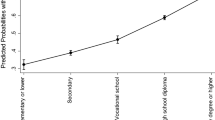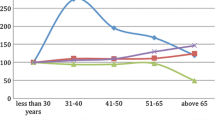Abstract
In this paper we study the impact of education on happiness in Spain using individual-level data from the European Social Survey, by means of estimating Ordinal Logit Models. We find both direct and indirect effects of education on happiness. First, we find an indirect effect of education on happiness through income and labour status. That is, we find that people with a higher education level have higher income levels and a higher probability of being employed, and thus, report higher levels of happiness. Second, and after controlling by income, labour status and other socio-economic variables, we find that education has a positive (and direct) impact on happiness. We interpret this result as evidence of a “self-confidence” or “self-estimation” effect from acquiring knowledge. Finally, we find that the direct impact of education on happiness does not depend of the level of education (primary, secondary or tertiary).
Similar content being viewed by others
Notes
See, for example, the recent conference of Bernanke (2010), the Chairman of the Board of Governors of the Federal Reserve System of the US, which presents a survey on happiness and economics.
The ESS is a biennial multi-country survey covering over 30 nations. The first round was fielded in 2002/2003. Some papers that also used the ESS are Benesch et al. (2006), Biancotti and D`Alessio (2007), Frey et al. (2007), Caporale et al. (2009), Sironi and Mencarini (2009) and recently, Cunado and Perez de Gracia (2010) among others.
See, for example, Maddala (1983) for a detail description of the Ordered Logit Model.
References
Albert, C., & Davia, M. A. (2005). Education, wages and job satisfaction. Paper presented at the Epunet Conference 2005, Colchester.
Alesina, A., Di Tella, R., & McCulloch, R. (2004). Inequality and happiness: Are European and Americans different? Journal of Public Economics, 88, 2009–2042.
Angeles, L. (2009). Do children make us happier? Mimeo: Department of Economics, University of Glasgow.
Becchetti, L., Castriota, S., & Londoño, D. (2006). Climate, happiness and the Kyoto protocol, CEIS Working Paper.
Benesch, C., Frey, B. S., & Stutzer, A. (2006). TV channels, self control and happiness, Institute for Empirical Research in Economics, University of Zurich WP Series No. 321.
Benhabib, J., & Spiegel, M. (1994). The role of human capital in economic development: Evidence from aggregate cross-country data. Journal of Monetary Economics, 34, 143–174.
Berger, M. C., & Leigh, J. P. (1989). Schooling, self-selection and health. Journal of Human Resources, 24, 433–455.
Bernanke, B. (2010). The economics of happiness, Conference at the University of North Carolina Commencement Ceremony, May 8, 2010, http://www.federalreserve.gov/newsevents/speech/bernanke20100508a.htm.
Biancotti, C., & D`Alessio, G. (2007). Inequality and happiness, Society for the Study of Economic Inequality—Working Paper—ECINEQU WP 2007–75.
Blanchflower, D. G. (2008). Happiness economics, NBER Reporter: Research Summary no. 2.
Blanchflower, D. G., & Oswald, A. J. (1994). Estimating a wage curve for Britain. The Economic Journal, 104, 1025–1043.
Blanchflower, D. G., & Oswald, A. J. (2004a). Well- being over time in Britain and the USA. Journal of Public Economics, 88, 1359–1386.
Blanchflower, D. G., & Oswald, A. J. (2004b). Money, sex and happiness: An empirical study. Scandinavian Journal of Economics, 106, 393–415.
Blanchflower, D., & Oswald, A. J. (2008). Hypertension and happiness across nations. Journal of Health Economics, 27, 218–233.
Brereton, F., Clinch, J. P., & Ferreira, S. (2008). Happiness, geography and environment. Ecological Economics, 65, 386–396.
Bruni, L., & Porta, P. L. (2007). Handbook on the economics of happiness. Northampton, MA: Edward Elgar.
Caporale, G. M., Georgellis, Y., Tsitsianis, N., & Ping, Y. Y. (2009). Income and happiness across Europe: Do reference values matter? Journal of Economic Psychology, 30, 42–51.
Castriota, S., (2006). Education and happiness: A further explanation to the Easterlin Paradox, mimeo.
Clark, A. E. (1997). Job satisfaction and gender: Why are women so happy at work? Labor Economics, 4, 341–372.
Clark, A. E. (2006). Born to be mild? Cohort effects don`t explain why well-being is U-shaped in age, Working Paper 2006–35, Paris-Jourdan Sciences Economiques.
Clark, A. E., Frijters, P., & Shields M.A. (2006). Income and happiness: Evidence, explanations and economic implications, Mimeo, Paris-Jourdan Sciences Economiques.
Clark, A. E., & Oswald, A. J. (1994). Unhappiness and unemployment. The Economic Journal, 104, 648–659.
Clark, A. E., & Oswald, A. J. (1996). Satisfaction and Comparison Income. Journal of Public Economics, 61, 359–381.
Clark, A. E., Georgellis, Y., & Sanfey, P. (2001). Scarring: The psychological effect of past unemployment. Economica, 68, 221–241.
Cunado, J., & Perez de Gracia, F. (2010). Environment and happiness: New evidence for Spain, Paper presented at the EUNIP 2010 Conference, Reus, Spain.
Di Tella, R., & MacCulloch, R. J. (2006). Some uses of happiness data in economics. Journal of Economic Perspectives, 20, 25–46.
Di Tella, R., MacCulloch, R. J., & Oswald, A. J. (2001). Preferences over inflation and unemployment: Evidence from surveys of happiness. American Economic Review, 91, 335–341.
Di Tella, R., MacCulloch, R. J., & Oswald, A. J. (2003). The macroeconomics of happiness. Review of Economics and Statistics, 85, 793–809.
Dockery, A. M. (2003). Happiness, life satisfaction and the role of work: Evidence from two Australian surveys, School of Economics and Finance working paper no.03.10, Curtin Business School.
Easterlin, R. A. (1974). Does economic growth improve the human lot? In Paul A. David & Melvin W. Reder (Eds.), Nations and households in economic growth: Essays in honor of Moses Abramovitz. Academic Press: New York.
Easterlin, R. A. (1995). Will raising the incomes of all increase the happiness of all? Journal of Economic Behaviour and Organisation, 27, 35–47.
Easterlin, R. A. (2001). Income and happiness: Towards a unified theory. The Economic Journal, 111, 465–484.
Easterlin, R. A. (2005). Building a better theory of well-being. In Luigino Bruni & Pier Luigi Porta (Eds.), Economics and happiness. Framing the analysis (pp. 29–64). Oxford: Oxford University Press.
Erikson, R. (1993). Descriptions of inequality: The Swedish approach to welfare research. In M. Nussbaum & A. Sen (Eds.), The quality of life. Oxford: Clarendon Press.
Ferrer-i-Carbonell, A. (2005). Income and well-being: an empirical analysis of the comparison income effect. Journal of Public Economics, 89, 997–1019.
Ferrer-i-Carbonell, A., & Gowdy, J. M. (2007). Environmental awareness and happiness. Ecological Economics, 60, 509–516.
Fleurbaey, M. (2009). Beyond GDP: The quest for a measure of social welfare. Journal of Economic Literature, 47, 1029–1075.
Florida, R., Mellander, C., & Rentfow, P. J. (2010). The happiness of cities, Working Paper Series—Martin Prosperity Research 2010–10.
Frey, B. S., & Stutzer, A. (2002a). What can economists learn from happiness research? Journal of Economic Literature, XL, 402–435.
Frey, B. S., & Stutzer, A. (2002b). Happiness and economics. Princeton: Princeton University Press.
Frey, B. S., Benesch, C., & Stutzer, A. (2007). Does watching TV make us happy? Journal of Economic Psychology, 28, 283–313.
Graham, C. (2008). The economics of happiness. In S. Durlauf & L. Blume (Eds.), New Palgrave Dictionary of Economics (2nd ed.). Macmillam: Basingstoke.
Hartog, J., & Oosterbeek, H. (1998). Health, wealth and happiness: Why pursue a higher education? Economics of Education Review, 17, 245–256.
Haveman, R. H., & Wolfe, B. L. (1984). Schooling and economic well-being: The role of non-market effects. Journal of Human Resources, 19, 377–407.
Hayo, B., & Seifert, W. (2003). Subjective economic well-being in Eastern Europe. Journal of Economic Psychology, 24, 329–348.
Headey, B., & Wooden, M. (2004). The effects of wealth and income on subjective well-being and ill-being. Economic Record, 80, S24–S33.
Helliwell, J. F. (2006). Well-being, social capital and public policy: What’s new? Economic Journal, 116, C34–C45.
Hickson, H., & Dockery, A. M. (2008). Is ignorance bliss: Exploring the links between education, expectations and happiness, 37th Australian Conference of Economists, Gold Coast.
Inglehart, R., & Klingemann, H. (2000). Genes, culture, democracy and happiness. In E. Diener & E. M. Suh (Eds.), Culture and subjective wellbeing (pp. 165–183). Boston: MIT Press.
Jones, C. I., & Klenow, P. J. (2010). Beyond GDP? Welfare across countries and time, NBER WP 16352.
Layard, R. (2005). Happiness: Lessons From a New Science. New York and London: Penguin.
Layard, R. (2006). Happiness and public policy: A challenge to the profession. Economic Journal, 116, C24–C33.
Lucas, R. (1988). On the mechanics of economic development. Journal of Monetary Economics, 22, 3–42.
Maddala, G. S. (1983). Limited dependent and qualitative variables in econometrics. Cambridge, UK: Cambridge University Press.
Mankiw, G., Romer, D., & Weil, D. (1992). A contribution to the empirics of economic growth. Quarterly Journal of Economics, 107, 407–438.
McBride, M. (2001). Relative-income effects on subjective well-being in the cross-section. Journal of Economic Behavior & Organization, 45, 251–278.
Michalos, A. C. (2007). Education, happiness and well-being, mimeo.
Nelson, R., & Phelps, E. (1966). Investment in humans, technological diffusion and economic growth. American Economic Review, 56, 69–75.
Peiro, A. (2006). Happiness, satisfaction and socio-economic conditions: Some international evidence. Journal of Socio Economics, 35, 348–365.
Rehdanz, K., & Maddison, D. (2005). Climate and happiness. Ecological Economics, 52, 111–125.
Ross, C., & Van Willigen, M. (1997). Education and the subjective quality of life. Journal of Health and Social Behavior, 38, 275–297.
Sironi, M., & Mencarini, L. (2009). Happiness, housework and gender inequality in Europe. A comparative of 26 countries with European Social Survey data, Mimeo.
Stevenson, B., & Wolfers, J. 2009. Economic growth and subjective well-being: Reassessing the Easterlin Paradox, Brookings Papers on Economic Activity, New York: Brookings Institution Press, .
Stiglitz, J. E., Sen, A., & Fitoussi, J. P. (2009). Report by the commission on the measurement of economic performance and social progress, Technical Report September 2009.
United Nations. (1954). International definition and measurement of standards and levels of living. New York: United Nations Publications.
Veenhoven, R. (1991a). Questions on happiness: Classical topics, modern answers, blind spots. In F. Strack, M. Argyle, & N. Schwarz (Eds.), Subjective well-being. Oxford: Pergamon Press.
Veenhoven, R. (1991b). Is happiness relative? Social Indicators Research, 24, 1–34.
Veenhoven, R. (1996). Development in satisfaction research. Social Indicators Research, 37, 101–160.
Winkelmann, L., & Winkelmann, R. (1998). Why are the unemployed so unhappy? Evidence from panel data. Economica, 65, 1–15.
Witter, R. A., Okun, M. A., Stock, W. A., & Haring, M. J. (1984). Education and subjective well-being: A meta-analysis. Educational Evaluation and Policy Analysis, 6, 165–173.
Acknowledgments
The authors gratefully acknowledge financial support provided by the Ministerio de Ciencia y Tecnología (ECO2008-02458-E) within the EUROCORES HumVIB programme of the European Science Foundation. We specially thank conference participants at the XIX Meeting of the Economics of Education Association (Zaragoza 2010) for insightful comments and suggestions. We thank the editor and one anonymous referee for useful comments and valuable suggestions on this paper.
Author information
Authors and Affiliations
Corresponding author
Rights and permissions
About this article
Cite this article
Cuñado, J., de Gracia, F.P. Does Education Affect Happiness? Evidence for Spain. Soc Indic Res 108, 185–196 (2012). https://doi.org/10.1007/s11205-011-9874-x
Accepted:
Published:
Issue Date:
DOI: https://doi.org/10.1007/s11205-011-9874-x




